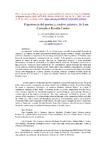Experiencia del poema y asidero plástico, de Luis Cernuda a Rosalía Castro

Use this link to cite
http://hdl.handle.net/2183/28234
Except where otherwise noted, this item's license is described as Atribución-NoComercial-SinDerivadas 3.0 España
Collections
- Investigación (FFIL) [879]
Metadata
Show full item recordTitle
Experiencia del poema y asidero plástico, de Luis Cernuda a Rosalía CastroAuthor(s)
Date
2021Citation
Luis Caparrós Esperante, "Experiencia del poema y asidero plástico, de Luis Cernuda a Rosalía Castro", Bulletin of Spanish Studies, 98:3 (2021), 387-409.
Abstract
[Resumen]: La expresión ‘asidero plástico’ la usa Cernuda para describir la necesidad de anclar el poema en los sentidos, de darle consistencia material para hacerlo creíble o ‘verdad’. Más allá de su lectura, el poema es experiencia. En otro lugar, menciona la ‘falacia patética’, de Ruskin, como forma de enmascaramiento sentimental de esa ‘verdad’. Todo apuntaría así a una enunciación poética en donde el sujeto procura objetivar su ‘experiencia emotiva’ y evita nombrarla directamente. Se trata de construirla en la subjetividad de quien lee. El término experiencia se liga a proceso: ‘el proceso de mi experiencia’. Es conocimiento logrado mediante una inmersión activa, anterior y posterior al texto escrito, donde intervienen sentidos y pensamiento, entidades complementarias, nunca hostiles. El poema es así una nueva experiencia del objeto. El artículo recorre esta búsqueda en la poesía anterior de paisaje, fórmula romántica favorita, desde las insuficiencias de Gil Carrasco a los logros de Antonio Machado con el precedente brillante de Rosalía Castro. [Abstract]: ‘Asidero plástico’ is the term used by Cernuda to describe the need for anchor the poem in the senses, to give it a material consistency aimed at its credibility or ‘truth’. Beyond its reading, the poem is experience. Elsewhere, he mentions Ruskin's ‘pathetic fallacy’ as a form of sentimental masking of that ‘truth’. Everything points to a poetic enunciation with the lyrical voice trying to objectify its ‘emotional experience’ and avoiding its direct naming. The key is constructing it in the reader’s subjectivity. The term ‘experience’ is linked to ‘process’: ‘the process of my experience’. It is knowledge achieved through active immersion, before and after the written text, where senses and thought are present as complementary entities, never hostile. The poem is thus a new experience of the object. The article goes through this search in previous poetry of landscape, romantic formula favorite, from Gil y Carrasco’s insufficiencies to Antonio Machado’s achievements and the brilliant precedent of Rosalía Castro.
Keywords
Luis Cernuda
Gil y Carrasco
Antonio Machado
Rosalía Castro
Poéticas de la modernidad
Sensaciones
Poesía meditativa
Poesía y verdad
Poesía y paisaje
Poesía como proceso de experiencia
Falacia poética
Poetics of modernity.
Sensations
Meditative poetry
Poetry and truth
Poetry andlLandscape
Poetry as a process of experience
Pathetic fallacy
Gil y Carrasco
Antonio Machado
Rosalía Castro
Poéticas de la modernidad
Sensaciones
Poesía meditativa
Poesía y verdad
Poesía y paisaje
Poesía como proceso de experiencia
Falacia poética
Poetics of modernity.
Sensations
Meditative poetry
Poetry and truth
Poetry andlLandscape
Poetry as a process of experience
Pathetic fallacy
Editor version
Rights
Atribución-NoComercial-SinDerivadas 3.0 España
ISSN
1475-3820






